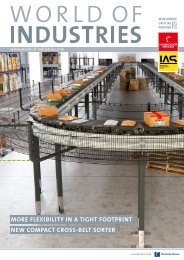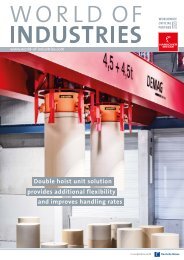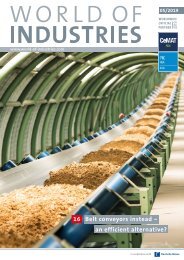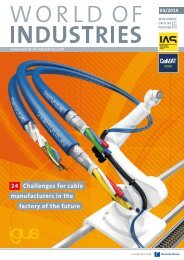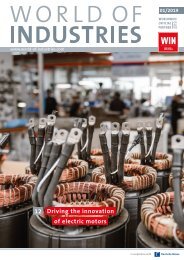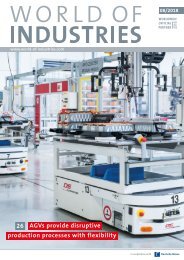WORLD OF INDUSTRIES 02/2018
WORLD OF INDUSTRIES 02/2018
WORLD OF INDUSTRIES 02/2018
- TAGS
- industries
Create successful ePaper yourself
Turn your PDF publications into a flip-book with our unique Google optimized e-Paper software.
NEWS AND MARKETS<br />
on improving its logistics performance index, a score on which it<br />
aims to join the ranks of the global top 20 by 2030.<br />
Mexico’s foreign trade and policy<br />
Mexico is an increasingly important consumer market and a production<br />
destination for companies all around the world. It is a very<br />
attractive location for foreign direct investment. Having your company’s<br />
manufacturing operations based in Mexico opens the door<br />
to favorable customs treatment to a whole range of countries. Apart<br />
from this, the country offers a sound economic policy, energy, infrastructure<br />
and tax reforms, and relatively low labor costs. Despite<br />
the current uncertainties, Mexico traditionally has close economic<br />
ties with the USA. It’s foreign trade has long been focused primarily<br />
on North America. Indeed, the USA is still indisputably Mexico’s<br />
most important trading partner. However, Mexico is now increasingly<br />
looking to diversify in order to insulate itself from the ups and<br />
downs of the American trade policy. Foreign trade is a key part of<br />
the Mexican economy and is currently supported by 12 free trade<br />
agreements covering a total of 46 countries, making the country<br />
Latin America’s largest import and export nation for commodity<br />
goods, far ahead of Brazil and roughly on par with Canada. Totaling<br />
more than $ 370 billion in 2016, Mexico’s overall export of goods<br />
is about twice as high as Brazil’s and only slightly below Canada’s<br />
export volume.<br />
Modernization of the free trade agreement with the EU ranks high<br />
on Mexico’s priority list. The plan to modernize the old agreement<br />
between the EU and Mexico has gained momentum in <strong>2018</strong>. Negotiations<br />
will include topics like market access, combined efforts on<br />
regulatory issues and the fight against corruption. Tariff-free trade<br />
of machinery and machinery parts is already stipulated in the trade<br />
section of the current agreement. However, this only applies to mechanical<br />
engineering products where over 70 % of the production<br />
is carried out within the EU or Mexico. Many mechanical engineering<br />
companies no longer fulfill this quota as individual parts of the<br />
value chains were outsourced to companies in third countries as<br />
part of globalization. Modernizing the outdated rules of origin is<br />
therefore an urgent requirement. Mexico also has its sights set on<br />
free trade agreements with several other countries, including Jordan,<br />
Paraguay and Turkey. It is also a member of the Pacific Alliance<br />
trade bloc, alongside Colombia, Peru and Chile, has plans to secure<br />
trade deals with Australia, New Zealand, Singapore, Vietnam, Malaysia<br />
and Brunei, and is extremely interested in developing closer<br />
economic relations with China.<br />
Important destination for German exports<br />
Taking a more specifically German perspective, Mexico is by far<br />
Germany’s biggest export destination in Latin America. From 2014<br />
to 2015, Germany’s exports to Mexico increased by 24 % to $ 11 billion<br />
– more than it exported to countries like Brazil and India. By<br />
contrast, Germany accounts for only 0.9 % of Mexico’s total exports.<br />
Mexico’s economic growth is very much export-led. For instance,<br />
in 2016, the country’s automobile and automotive subcontracting<br />
industries exported more than 3 million vehicles. In short, automobiles<br />
and auto parts make up half of Mexico’s exports. German companies<br />
like Volkswagen has a large-scale manufacturing presence<br />
there for many years. Volkswagen, Daimler, BMW and Audi have<br />
all recently either opened up new or expanded existing plants in<br />
Mexico. The lion’s share of foreign investment goes into automobile<br />
manufacturing and automotive subcontracting, pharmaceuticals,<br />
chemicals and logistics. Figures released by the German Association<br />
of the Automotive Industry (VDA) indicate that the number of<br />
German subcontractors in Mexico has jumped from 40 to 150 since<br />
2010. The total number of German companies in Mexico has also<br />
increased sharply, and, according to the German-Mexican Chamber<br />
of Commerce, is currently sitting at around 2,000.<br />
In recent years, Mexico has become an important market for mechanical<br />
engineering companies in Germany. Machinery exports<br />
from Germany almost reached € 2.5 billion in 2016. Sectors such<br />
as machine tools, plastics and rubber machinery, food and packaging<br />
machinery and precision tools were the branches with the highest<br />
demand in 2016. In 2017, by the end of November, the overall<br />
machinery exports had reported an increase of more than 25 %,<br />
reaching nearly € 3 billion. Mechanical engineering companies<br />
are benefiting from Mexico’s industrialization, machinery suppliers<br />
from Germany have been significantly involved in the tangible<br />
upward trend of the manufacturing industry in Mexico since 2009.<br />
Apart from the automotive sector, the Mexican food and beverage<br />
industries are one of the best-performing areas. Due to the strong<br />
competition and the statutory provisions in the food industry, the<br />
necessity to invest in modern machinery and equipment is particularly<br />
high in these sectors. Machinery suppliers from Germany can<br />
provide the innovative cutting-edge technology required here.<br />
Mexico at Hannover<br />
Every year, the Federation for German industries (BDI) and Hannover<br />
Messe, the world’s leading trade show for industrial technology,<br />
shines its spotlight on a chosen Partner Country. At this year’s<br />
Messe, Mexico will be that country. As Partner Country, Mexico will<br />
have the chance to present itself as an attractive investment destination<br />
as well as it can showcase its innovative spirit and technological<br />
developments in the manufacturing sector – factors that make it<br />
a key player on the global stage. As the Partner Country at this year’s<br />
show, Mexico wants to demonstrate that it is interested in sustainable<br />
industrial and economic development driven by innovative<br />
technologies like industrial automation, IT and integrated energy.<br />
Apart from domestic industrialization, the country’s main economic<br />
focus is on opening up foreign markets and supporting innovative<br />
home-grown companies. Mexico currently has more than 30<br />
clusters implementing industry 4.0 and IoT technologies, more than<br />
90 research and design centers related to advanced manufacturing<br />
and industrial innovation. Many Mexican companies are already<br />
developing industry 4.0 technologies and are thus highly attractive<br />
partners for foreign companies. For the Latin American country,<br />
participation in Hannover is an opportunity to send a clear signal to<br />
the European Union that despite rising protectionism, globalization<br />
is still the way forward.<br />
Photographs: Lead Photo Fotolia, Deutsche Messe AG<br />
www.hannovermesse.de/de/rahmenprogramm/partnerland-mexiko<br />
14 <strong>WORLD</strong> <strong>OF</strong> <strong>INDUSTRIES</strong> 2/<strong>2018</strong>




